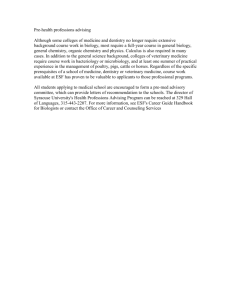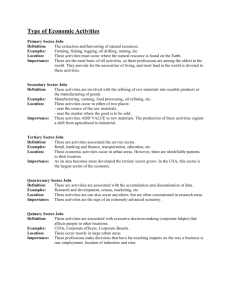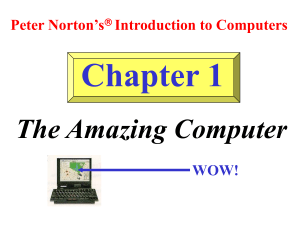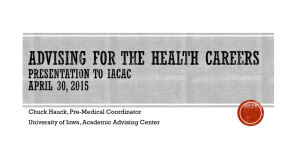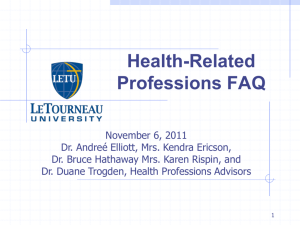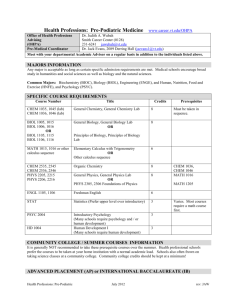for first year students
advertisement
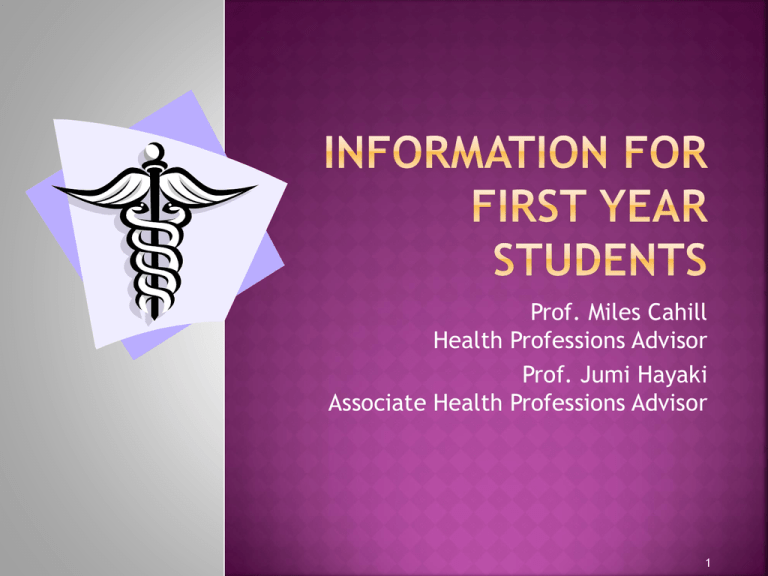
Prof. Miles Cahill Health Professions Advisor Prof. Jumi Hayaki Associate Health Professions Advisor 1 What is health professions advising? What should you do in the first and second years? Third and fourth? What courses do you need? What other health professions are available besides medical school? Questions? 2 We provide advice for students who are interested in applying to a variety of health professional schools. You are automatically registered by checking off “health professions” as a career interest in your Gateways questionnaire If not, you may e-mail the HP office (mcasello@holycross.edu) We will help you find courses you need, experience, etc. You will be assigned an advisor from the committee the year you are thinking of applying 3 Prof. Miles Cahill Professor, Economics HP Advisor Advising for third and fourth year students Chair of HPA committee Help with questions like Am I ready to apply? Where should I apply? How can I get ready? Prof. Jumi Hayaki Associate Professor, Psychology Associate HP Advisor Advising for first and second year students Help with questions like Can I study abroad and apply to medical school? What do I do if I get a C in orgo? Appointments: contact Ms. Mickie Casello, x2533, Stein 129A 4 Major in a subject you like, but be careful to fit in all required courses Don’t rush but be aware of requirements Don’t bite off more then you can handle but don’t take light loads (e.g., 3 Courses) or choose majors just for expected GPA bump Medical schools expect to see you thrived in a rigorous program and you thoughtfully engaged in a discipline Don’t get discouraged too early Grades are the most important factor at this point But, keep a rigorous academic schedule Very few apply to enter medical school straight from college Concentrate on doing well overall and in science It doesn’t have to be a science! Many students improve after first year or two Medical schools look at trajectory and distance traveled Get experience in clinic in summers & in jr./sr. years Volunteer, internships, etc. Work in clinic is ideal, but volunteer work is important too Working in a homeless shelter may be better than shadowing a surgeon Long-term low-hours better than short intensity 5 Get to know your professors They will provide valuable advice and you will need recommendations! Goals for extracurricular activities Begin to understand what its like to be from different backgrounds and cultures Learn to communicate with people different from you Learn to work with people under stress Learn what the life and work of a health care professional is like Show compassion for others Develop leadership skills 6 Atoms and Molecules -> Organic Chemistry 1 Organic Chemistry 2 -> Equilibrium and Reactivity Typically A&M starts in fall, a few seats in spring Biochemistry In Bio or Chem department Introduction 1 to Biology 1 & 2 (161 and 162) Offered every semester Introduction to Physics 1 & 2 Calculus 1 (or AP AB) For Physics 1 and E&R 7 Social science Introduction to Psychology The Sociological Perspective Statistics Medical schools also require a year of English/Literature Taken in any department as part of major or Math 220 Usually one ENGL and another LIT/AP course suffices Additional considerations The MCAT has a section interpreting readings in humanities, ethics, social sciences 8 The AAMC and some medical schools are using a “competency” language Competency is the ability to do something as opposed to just have taken a particular course However, medical schools are clear that they expect most competencies will be met by taking traditional courses and performing well on the MCAT Some may accept specialized courses or indepth experiences but these are unusual e.g. working 2 years in a biochem lab for biochem 9 Biology majors may meet many requirements Intro to Bio 161, 162 General and organic chemistry sequences Biochemistry Statistics Calculus 1 Chemistry majors also meet several requirements General and organic chemistry sequences Biochemistry General Physics 1 Calculus 1 10 You will be just as competitive and highly sought after Medical schools value a diverse class But, there is little space for exploration, additional programs 15 MCAT courses + 7 common area requirements + 1 MONT = 23 This leaves 9 courses for major, minor, electives, study abroad, etc. This is possible but try to make every course count! 11 Different health professions have different entry requirements Most health professions do not have standard requirements Requirements vary from school to school Some required courses may not be offered at HC You may need to take coursework through Consortium, in summer or after graduation Go to HP web site to pages for allied health professions Look up your health profession’s society, individual schools Speak with Prof. Hayaki or Prof. Cahill 12 Dental school 2014 MCAT requirements Most schools require biochemistry, some extra courses Physician assistant (PA) Intro to bio 161, 162 General chem 1 & 2, organic chem 1 Biochem, microbio, anatomy and physiology 1 & 2 Statistics Significant patient contact work (3 mo – 1 yr) Nursing (NP) Similar to PA Usually less science (A&M & Orgo 1, Biol 161, microbio, A&P 1&2) More social science (intro psych, developmental psych) Nutrition Note: Can take some classes at another Worcester-area college if necessary 13 The Health Professions Advising Committee will help you: Consider the application decision seriously Give you feedback Compile your application file, recommendation Through the application process Very few juniors apply to health professional schools Majority of applicants are alumni You are still fully supported after you graduate 14 How to fit in study abroad Non-U.S. resident/citizen thinking of applying in US Different health care vocations Summer classes 15 Answers to many questions on HP web page If you have any other questions, concerns or issues contact Ms. Casello to make an appointment (x2533) Don’t rush, do well in courses Take advantage of all help Cultivate references! Don’t be discouraged by a few early struggles Think about various health professions Use resources like Career Development Read! Novels, non-fiction, New York Times, New Yorker, Academic Medicine, JAMA Be professional Don’t get into trouble! 16 Quote from a letter: “If anyone had told me in the Fall of 2008 that I would be writing a letter for [X], I would have laughed. [The class] was a disaster... His background was very weak compared to the class, and he barely passed the three exams and final…. To his credit, he never considered dropping the course… “To make a long story short, he did a complete turnaround, both academically and personally. He earned 452/500 (A) during the second semester…” Result: Highly recommended for medical school 17
